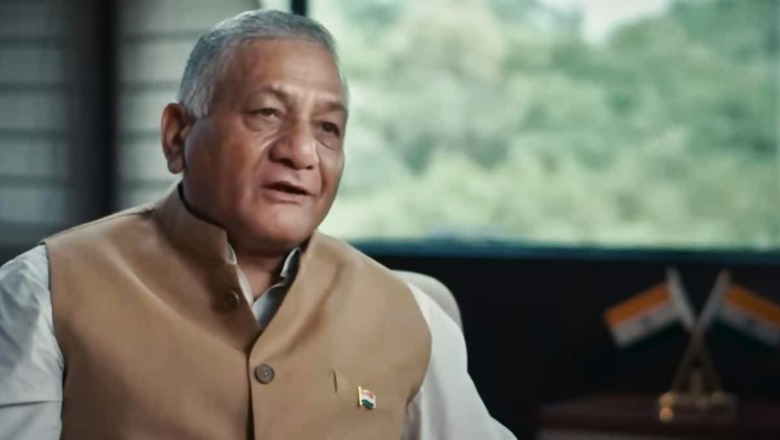
views
Prime Minister Narendra Modi has, over the years, developed cordial relations with world leaders that became most evident during ‘Operation Ganga’, through which 22,500 Indian nationals were evacuated from war-torn Ukraine last year. The country was invaded by its neighbour Russia on February 24, 2022, in what President Vladimir Putin called “special operations".
History TV18’s original documentary, The Evacuation: Operation Ganga, which premiered on Saturday (June 17) shows how, in such a situation, the central government successfully evacuated the large population of Indian students spread across Ukraine. Many of them were caught in the crossfire while others patiently waited without food, water and other basic necessities to return home. A medical student Naveen Shekharappa from Karnataka was killed in shelling in Kharkiv, while a language student Harjot Singh was grievously injured in firing in capital Kyiv.
In the documentary, union minister Gen VK Singh (Retd), who was sent to Poland for coordination, said Prime Minister Modi personally reached out to the heads of these neighbouring countries and requested that they ease visa restrictions and help fast-track border transit.
With the Polish border jammed with large numbers of Ukrainians trying to flee the country, India’s special relationship with the country only made it easier for students to be evacuated from the Polish border and onto special flights. In fact, the last Indian Air Force C17 transport aircraft also exited from Poland with the Sumy students, a recuperating Harjot and 12 to 13 four-legged friends.
The Centre had zeroed in on five countries sharing their border with Ukraine — Poland, Hungary, Romania, Slovakia and Moldova — and also sent union ministers Jyotiraditya Scindia, Kiren Rijiju, Hardeep Singh Puri and Gen VK Singh (Retd) to coordinate on the ground.
Gen Singh said: “What the prime minister said was we have to coordinate everything diplomatically, our mission in Ukraine. How to get the students out, the exit means we have to find ourselves but the aim should be to get them out as fast as possible."
As the war raged in Ukraine, Prime Minister Modi was in touch with major world leaders, including the head of the European Union, French President Emmanuel Macron, and Polish president Andrezj Duda. He thanked them all for relaxing visa laws to enable Indians to leave the conflict zone from within their countries.
“Poland and India have a very special relationship. In the World War II, they sent out a lot of their children so that they could take refuge outside and, when the war was finished, they could return. They went to many countries and were all turned back and ultimately landed in Gujarat’s Jamnagar; and that is when the king said they’re all his children. He adopted them as his own. So, Poland holds us in a very special friendship because of this and it’s the reason why Indians who were coming out of there were all getting Schengen visa for 15 days. No other country got it," Gen Singh said.
The documentary shows how the prime minister put his statesmanship to the fore and even called presidents Vladimir Putin of Russia and Volodymyr Zelenskyy of Ukraine to create ‘green’ or ‘humanitarian’ corridors. Modi’s astute decision to write personal letters to the heads of the neighbouring countries of Ukraine not only had an emotional effect but also helped galvanise support for India’s rescue operation.
“Our relentless efforts spanned across neighbouring countries like Poland, Slovakia, Hungary, Romania, and later Moldova, as we sought their cooperation for facilitating the evacuation process from Ukraine. Through diplomatic channels, the prime minister engaged with President Putin, securing a ceasefire during the evacuation period and obtaining designated routes for evacuation. While numerous countries struggled to evacuate their citizens with just a couple of flights, India successfully coordinated 90 flights to safely send back Indian students. Our nation’s important voice continues to play a pivotal role in shaping outcomes on the global stage," said external affairs minister S Jaishankar in the documentary.
Poland and India have otherwise shared friendly relations for long now. Diplomatic relations were established in 1954, and an Indian Embassy was opened in Warsaw in 1957. The two countries share common ideological perceptions, based on their opposition to colonialism, imperialism and racism. Bilateral ties were strong even during the Communist era, coupled with high-level political links and vibrant cultural engagement.
Poland remained close to India even after the advent of democracy in 1989 and has since shared a cordial political relationship. It is one of India’s key economic partners in Central Europe.














Comments
0 comment